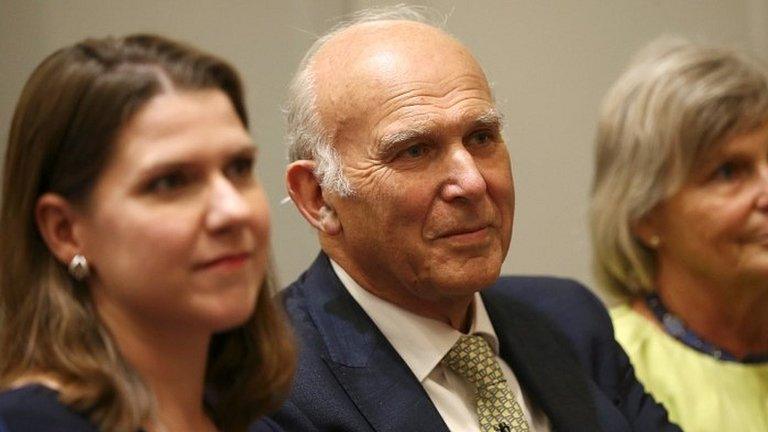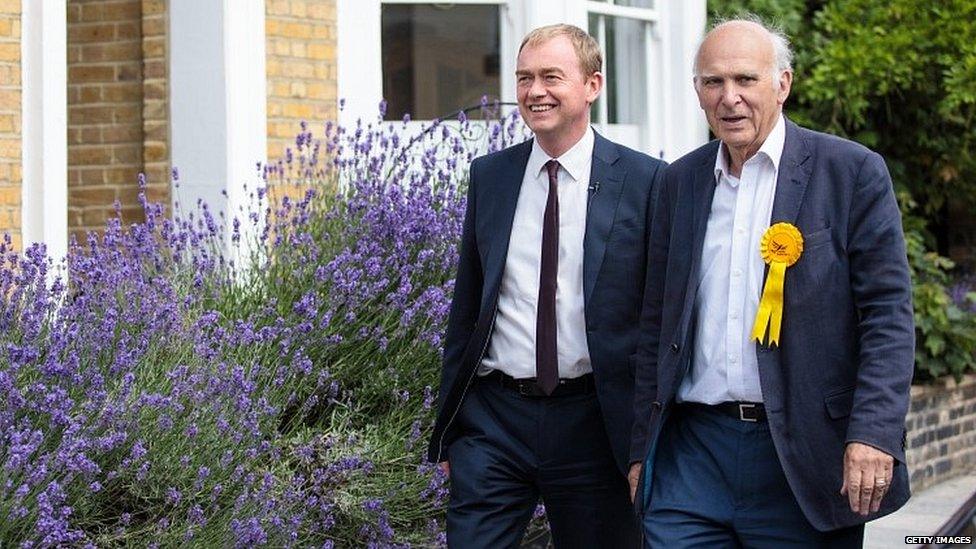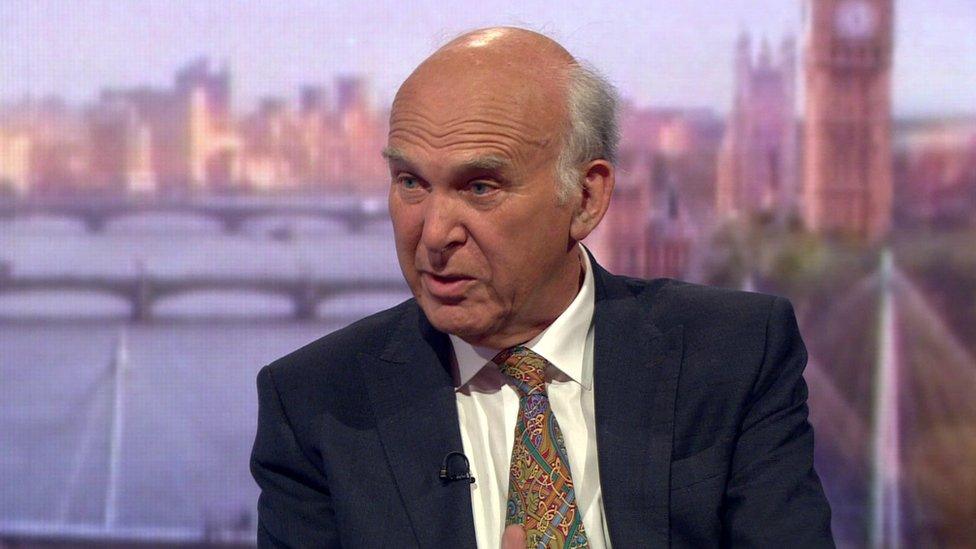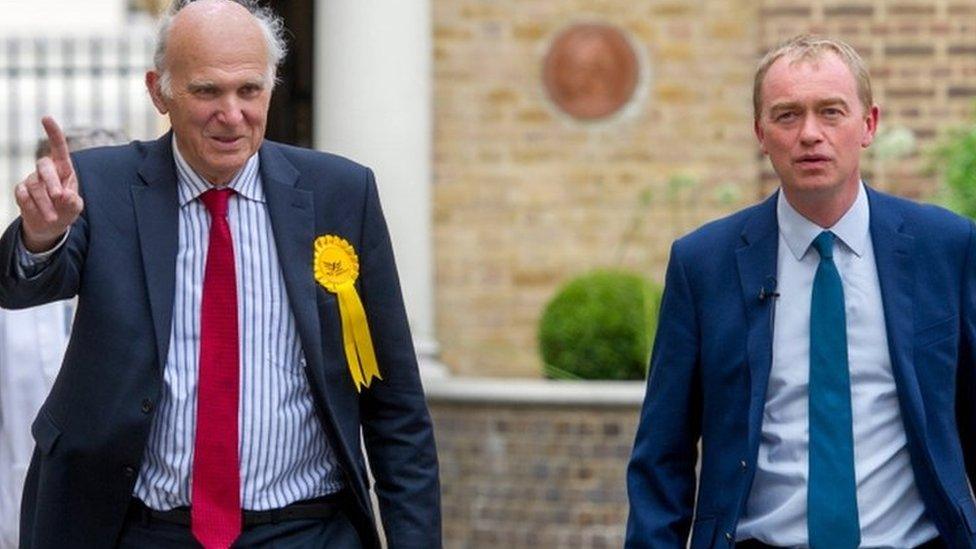Vince Cable is new Lib Dem leader
- Published

Vince Cable, with new deputy leader Jo Swinson, left.
Sir Vince Cable is the new leader of the Liberal Democrats, after no-one stood against him.
The 74-year old Twickenham MP was the only candidate on the ballot paper when nominations closed at 16:00 BST.
The former business secretary said there should be an "exit from Brexit" and he believed the party's call for a second referendum would be vindicated.
He also said he did not intend to be a "caretaker" leader and he would "serve as long as I need to".
Sir Vince, who has been acting and deputy leader in the past, has argued that Brexit is not inevitable.
He assumes the leadership vacated by Tim Farron, who stood down after a disappointing general election in which the party increased its number of MPs from nine to 12 but saw its vote share fall to 7.4%.
'Exit from Brexit'
Sir Vince paid tribute to his predecessor as he was announced as the new leader, saying Mr Farron had taken over the leadership at a time of crisis for the party and had rebuilt its membership to record levels.
He argued that the Conservatives and Labour had been taken over by "ideologues" and British politics had lost its "basic common sense", moderation and mutual respect - his aim was for the Liberal Democrats to move into that space.
He warned that he feared the UK was "heading for a disastrous outcome" over Brexit, headed by a dysfunctional and disunited government - and said he felt there should be an "exit from Brexit".
The party's main campaign pledge during the election was to give the public the final say on the terms of the UK's exit from the EU in a further referendum, ahead of the scheduled withdrawal date in March 2019.
Although Sir Vince has admitted this message did not "cut through", he has argued that attitudes are beginning to change and that the public mood will come round to the party's position.
He said as the difficulties of Brexit became clearer, Mr Farron's policy would be "absolutely vindicated". He added: "I'm ambitious for this country and I'm ambitious for this party. In difficult times, we have shown enormous resilience but I believe we can fight our way back, break through and make an enormous success of our party and eventually, in government."

At-a-glance: Sir Vince Cable

Sir Vince has ruled out coalitions with the Tories and with a Jeremy Corbyn-led Labour party
Born: 9 May 1943, in York
Educated: Grammar school, Cambridge University
Family: Father of three grown-up children by his first wife, Olympia, who died in 2001. Remarried in 2004.
Job before politics: Economist, lecturer and adviser to the Kenyan government and senior Labour politicians. Chief economist at oil giant Shell.
Political career: A Labour councillor in Glasgow the 1970s, who joined the SDP in 1982 and then won his Twickenham seat for the Lib Dems at the second attempt in 1997. Stood in as Lib Dem leader when Sir Menzies Campbell quit in 2007, was business secretary in the coalition government between 2010 and 2015, before losing his seat. Returned to the Commons in June. Knighted in 2015.
Off duty: Ballroom dancing and writing - about to publish his first novel, a political thriller about a post-Brexit future called Open Arms

He has said the Conservative and Labour leaderships are conspiring to negotiate a "hard Brexit" and he is willing to work with MPs from other parties to thwart this.
Sir Vince, who was knighted last year, was elected unopposed after other potential candidates, including Jo Swinson, Norman Lamb and Sir Ed Davey, said they would not be putting themselves forward.
The veteran politician, who was a Labour councillor in the 1970s before defecting to the SDP and later joining the Liberal Democrats, has never stood for the party's leadership before.
But he has become one of its most recognisable and influential figures, having served as deputy to former leaders Sir Menzies Campbell and Nick Clegg, and been a cabinet minister in the Tory-Lib Dem government for five years.
He will be the oldest leader of the party in its near 30-year history.
He has insisted he has the energy, as well as the experience, to lead the Lib Dems into the next election, which he believes will happen sooner rather than later.
Mr Farron announced his decision to quit a week after last month's poll, citing the pressures of trying to reconcile his Christian beliefs with his leadership of a progressive political party.
He later said that he had decided to step down early on in the election campaign - a campaign in which he was forced to clarify on several occasions his views on whether gay sex was a sin or not.
- Published9 July 2017

- Published3 July 2017
